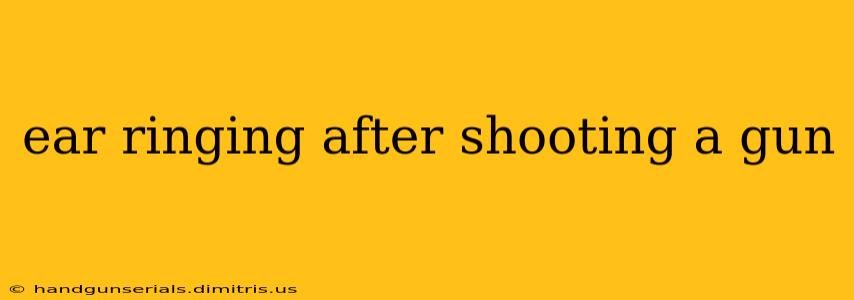Experiencing ear ringing, or tinnitus, after shooting a gun is a common occurrence, but that doesn't make it any less serious. The intense noise from firearms can cause temporary or permanent hearing loss if proper precautions aren't taken. This comprehensive guide will explore the causes of post-shooting tinnitus, the severity of potential damage, and crucially, how to protect your hearing on the range.
Understanding the Connection Between Gunfire and Tinnitus
The loud report of a firearm generates sound waves far exceeding safe levels for human hearing. These intense sound waves can damage the delicate hair cells within the inner ear, responsible for transmitting sound signals to the brain. This damage manifests as tinnitus, often described as a ringing, buzzing, hissing, or clicking sound in one or both ears.
The severity of the tinnitus depends on several factors:
- Type of firearm: Larger caliber firearms generally produce louder sounds.
- Distance from the firearm: Being closer to the muzzle increases the risk of hearing damage.
- Duration of exposure: Firing multiple rounds without breaks significantly increases the cumulative effect.
- Hearing protection used: The efficacy of hearing protection is paramount in mitigating damage.
Types of Hearing Damage from Gunfire
Tinnitus is a symptom of noise-induced hearing loss (NIHL). NIHL can range from temporary threshold shift (TTS), where hearing recovers after a period of rest, to permanent threshold shift (PTS), resulting in permanent hearing loss. PTS can significantly impact daily life, making it difficult to hear conversations, appreciate music, or even be aware of environmental sounds.
Recognizing the Symptoms
While tinnitus is the most common symptom, other indicators of hearing damage after shooting include:
- Muffled hearing: Sounds seem quieter or distorted.
- Difficulty understanding speech: Struggling to follow conversations, particularly in noisy environments.
- Pain in the ears: Aching or pressure in the ear canals.
- Feeling of fullness in the ears: A sensation of blockage or pressure.
Protecting Your Hearing on the Firing Range
Preventing hearing damage is far more effective than treating it. Here's how to safeguard your hearing while enjoying shooting activities:
Utilizing Hearing Protection
This is the single most crucial step. Invest in high-quality hearing protection, specifically designed for shooting:
- Hearing Protection Ratings: Look for a Noise Reduction Rating (NRR) of at least 22 decibels (dB) or higher. Higher NRR values mean better protection.
- Electronic Earmuffs: These allow you to hear ambient sounds while significantly reducing the intensity of the gunshot. This is preferable to passive muffs, which completely block sound.
- Foam Earplugs: Use these in conjunction with earmuffs for maximum protection. Ensure proper insertion for optimal effectiveness.
- Custom-molded earplugs: These offer superior comfort and noise reduction compared to standard foam earplugs.
Other Protective Measures
Besides hearing protection, additional steps can minimize the risk:
- Maintain Distance: Shoot from a safe distance whenever possible.
- Proper Gun Maintenance: Ensure your firearm is properly maintained to minimize unexpected loud noises.
- Breaks and Rest: Take regular breaks between shooting sessions to allow your ears to recover.
- Regular Hearing Checkups: Schedule regular hearing tests with an audiologist, especially if you are a frequent shooter.
Seeking Medical Attention
If you experience any of the symptoms mentioned above, even temporarily, consult a doctor or audiologist immediately. Early diagnosis and intervention are crucial for managing NIHL and preventing further damage. Prompt treatment can help mitigate the effects of hearing loss and tinnitus.
Disclaimer: This information is for general knowledge and informational purposes only, and does not constitute medical advice. Always consult with a qualified healthcare professional for any health concerns or before making any decisions related to your health or treatment.

